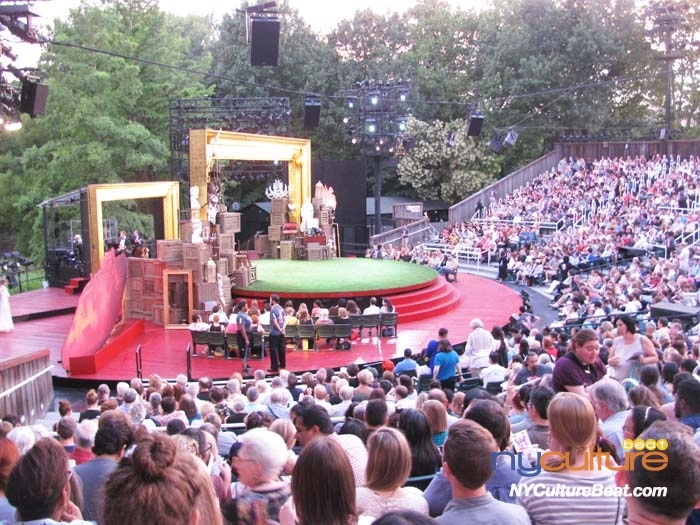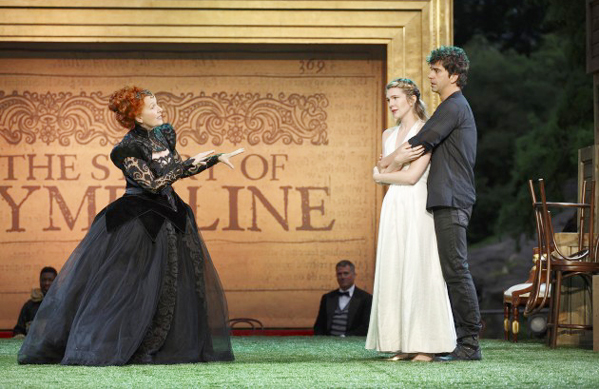셰익스피어의 인생에 관한 명언/ Shakespeare Quotes

2015 셰익스피어 인더 파크 '심벨린' 공연 시작 전 센트럴파크 내 델라코트시어터.
-가난해도 만족하는 사람은 부자이다.
-겁쟁이는 죽음에 앞서서 여러 차례 죽지만, 용기 있는 자는 한번 밖에 죽지 않는다.
-겸손은 범인(凡人)에게는 한갓 성실이지만, 위대한 재능의 소유자에게는 위선이다.
-경제가 허용하는 한, 몸에 걸치는 것에는 돈을 아끼지 말아라. 그렇다고 지나치게 차려 입어서는 안 된다. 대개 입은 것으로 미루어 그 인물을 알 수 있으니까.
-구하면 못 얻을 것이 없다. 그러나 젊은 사람들은 이 점을 잘 모르고 열린 감이 입으로 떨어지기만을 기다리고 있다. 희망은 산과 같은 것이다. 저쪽에서는 기다리고, 단단히 마음먹고 떠난 사람들은 모두 산꼭대기에 도착할 수 있다. 산은 올라가는 사람에게만 정복된다. 마음을 기쁘게 해주면 백해(百害)를 막고 수명을 연장할 수 있다.
-구해서 얻은 사랑은 좋은 것이다. 그러나 구하지 않고 얻은 것은 더욱 좋다.
-궁핍한 사람에게 필요한 약은 오직 희망이며, 부유한 사람에게 필요한 약은 오직 근면뿐이다.
-그대의 얼굴에서 나는 지도를 보듯 명예와 정직과 충성을 보오.
-남의 잘못에 대해서 관용하라. 오늘 저지른 남의 잘못은 어제의 내 잘못이었던 것을 생각하라. 잘못이 없는 사람은 하나도 없다. 완전하지 못한 것이 사람이라는 점을 항상 생각해야 하는 것이다. 우리는 언제나 정의를 받들어야 하지만, 정의만으로 재판을 한다면 우리들 중에 단 한 사람도 구원받지 못할 것이다.
-내가 누구인지 말할 수 있는 자는 누구인가?
-내가 먼저 할 일은 나 자신에게 진실해야 한다는 점이다. 어찌 자신이 진실치 못하면서 남이 나에게 진실하기를 바라겠는가? 만일 그대가 그대에게 진실하다면 밤이 낮을 따르듯 아무도 그대에게 거짓말을 하지 않게 될 것이다.
-마음의 준비만이라도 되어 있으면 모든 준비는 완료된 것이다.
-말리면 말릴수록 불타는 것이 사랑이다. 졸졸 흐르는 시냇물도 막으면 막을수록 거세게 흐른다.
-말없는 보석이 살아있는 인간의 말보다 흔히 여자의 마음을 움직인다.
-명예는 물위의 파문과 같으니, 결국은 무로 끝난다.
-무식은 신의 저주이며 지식은 하늘에 이르는 날개다.
-배반당하는 자는 배반으로 인해서 상처를 입게 되지만, 배반하는 자는 한층 더 비참한 상태에 놓여지게 마련이다.
-뿌리가 없으면 꽃이 피지 못한다. 인격은 사상의 뿌리이다. 사상은 작으나 크나, 그 사람의 인격을 토대로 해서 세워진 하나의 건축이다. 토대와 밑받침 없는 사상은 허물어지기 쉽다. 꽃에 향기가 있듯이 사람에게도 품격이란 것이 있다. 꽃도 그 생명이 생생할 때에 향기가 신선하듯이 사람도 그 마음이 맑지 못하면 품격을 보전하기 어렵다. 썩은 백합꽃은 잡초보다 오히려 그 냄새가 고약하다.
-비참한 인간들에겐 희망이 약이다.
-안심, 그것이 인간에 가장 가까이 있는 적이다.
-약한 자여, 그대의 이름은 여자이니라.
-여자는 약하나, 어머니는 강하다.
-여자를 교만하게 하는 것은 그 미모이며 찬양 받게 하는 것은 그 덕성이다. 그러나 덕성과 미모를 겸비하면 신성을 가진 것이다.
-역경이 사람한테 부여하는 것이야말로 아름답구나. 그것은 두꺼비와 같아서 더럽고 독을 품고는 있지만, 그 머리 속에는 보옥(寶玉)을 감추고 있다.
-용기의 대부분은 조심성이다.
-우리 모두가 주인 노릇을 할 수는 없다.
-우리 인생의 옷감은 선과 악이 뒤섞인 실로 짜여진 것이다.
-이것이 최악이라고 말할 수 있는 동안은 아직 괜찮다.
-인간이 가장 먼저 해야 할 일은 자기 자신에게 진실해야 한다는 것이다. 스스로는 진실치 못하면서 남이 자기에게 어찌 진실하기를 바라겠는가. 만약 스스로에게 진실하다면, 밤이 낮을 따르듯 대개의 일이 순리대로 풀릴 것이다. 진실처럼 아름다운 것은 없다. 진실을 구하자. 진실로 무장하자.
-인생은 불확실한 항해이다.
-일년내내 노는 날로 지속된다면 놀이도 일과 마찬가지로 따분한 것이 된다.
-일단 일에 참여하면, 목표로 한 모든 것을 성취할 때까지 손떼지 말라.
-정직만큼 부유한 유산도 없다.
-죽음이 다가오는 것을 그처럼 두려워한다는 것은 바로 생전의 사악한 생활의 증거이다.
-지식은 우리가 하늘로 비상하는 날개이다.
-진실은 백일하에 드러날 것이고, 살인도 오래 숨기지는 못한다.
-진실한 사랑의 길은 결코 평탄하지 않다.
-진정한 사랑의 길은 험한 가시밭길이다.
-최상급의 용기는 분별력이다.
-타인의 비판은 되도록 받아들이는 것이 좋지만, 타인의 판단은 따로 두는 것이 현명하다.
-험한 언덕을 오르려면 처음에는 서서히 걸어야 한다.
-현실의 공포는 마음에 그리는 공포만큼 두렵지 않다.
-끝이 좋으면 모두가 좋다.
<마음에 영원히 남을 셰익스피어의 명언> 조현석 저, 북인출판사, 2006.

A scene from "Cymbeline" Shakespeare in the Park, 2015 Photo: Public Theater, Carol Rosegg
Cymbeline
"The game is up." - (Act III, Scene III).
"I have not slept one wink.". - (Act III, Scene III).
Hamlet
To be, or not to be: that is the question". - (Act III, Scene I).
"Neither a borrower nor a lender be; For loan oft loses both itself and friend, and borrowing dulls the edge of husbandry". - (Act I, Scene III).
"This above all: to thine own self be true". - (Act I, Scene III).
"Though this be madness, yet there is method in 't.". - (Act II, Scene II).
"That it should come to this!". - (Act I, Scene II).
"There is nothing either good or bad, but thinking makes it so". - (Act II, Scene II).
"What a piece of work is man! how noble in reason! how infinite in faculty! in form and moving how express and admirable! in action how like an angel! in apprehension how like a god! the beauty of the world, the paragon of animals! ". - (Act II, Scene II).
"The lady doth protest too much, methinks". - (Act III, Scene II).
"In my mind's eye". - (Act I, Scene II).
"A little more than kin, and less than kind". - (Act I, Scene II).
"The play 's the thing wherein I'll catch the conscience of the king". - (Act II, Scene II).
"And it must follow, as the night the day, thou canst not then be false to any man". - (Act I, Scene III)."This is the very ecstasy of love". - (Act II, Scene I).
"Brevity is the soul of wit". - (Act II, Scene II).
"Doubt that the sun doth move, doubt truth to be a liar, but never doubt I love". - (Act II, Scene II).
"Rich gifts wax poor when givers prove unkind". - (Act III, Scene I).
"Do you think I am easier to be played on than a pipe?" - (Act III, Scene II).
"I will speak daggers to her, but use none". - (Act III, Scene II).
"When sorrows come, they come not single spies, but in battalions". - (Act IV, Scene V).
As You Like It
"All the world 's a stage, and all the men and women merely players. They have their exits and their entrances; And one man in his time plays many parts" - (Act II, Scene VII).
"Can one desire too much of a good thing?". - (Act IV, Scene I).
"I like this place and willingly could waste my time in it" - (Act II, Scene IV).
"How bitter a thing it is to look into happiness through another man's eyes!" - (Act V, Scene II).
"Blow, blow, thou winter wind! Thou art not so unkind as man's ingratitude".(Act II, Scene VII).
"True is it that we have seen better days". - (Act II, Scene VII).
"For ever and a day". - (Act IV, Scene I).
"The fool doth think he is wise, but the wise man knows himself to be a fool". - (Act V, Scene I).
King Richard III
"Now is the winter of our discontent". - (Act I, Scene I).
"A horse! a horse! my kingdom for a horse!". - (Act V, Scene IV).
"Conscience is but a word that cowards use, devised at first to keep the strong in awe". - (Act V, Scene III).
"So wise so young, they say, do never live long". - (Act III, Scene I).
"Off with his head!" - (Act III, Scene IV).
"An honest tale speeds best, being plainly told". - (Act IV, Scene IV).
"The king's name is a tower of strength". - (Act V, Scene III).
"The world is grown so bad, that wrens make prey where eagles dare not perch". - (Act I, Scene III).
Romeo and Juliet
"O Romeo, Romeo! wherefore art thou Romeo?". - (Act II, Scene II).
"It is the east, and Juliet is the sun" . - (Act II, Scene II).
"Good Night, Good night! Parting is such sweet sorrow, that I shall say good night till it be morrow." - (Act II, Scene II).
"What's in a name? That which we call a rose by any other name would smell as sweet". - (Act II, Scene II).
"Wisely and slow; they stumble that run fast". - (Act II, Scene III).
"Tempt not a desperate man". - (Act V, Scene III).
"For you and I are past our dancing days" . - (Act I, Scene V).
"O! she doth teach the torches to burn bright". - (Act I, Scene V).
"It seems she hangs upon the cheek of night like a rich jewel in an Ethiope's ear" . - (Act I, Scene V).
"See, how she leans her cheek upon her hand! O that I were a glove upon that hand, that I might touch that cheek!". - (Act II, Scene II).
"Not stepping o'er the bounds of modesty". - (Act IV, Scene II).
The Merchant of Venice
"But love is blind, and lovers cannot see".
"If you prick us, do we not bleed? if you tickle us, do we not laugh? if you poison us, do we not die? and if you wrong us, shall we not revenge?". - (Act III, Scene I).
"The devil can cite Scripture for his purpose". - (Act I, Scene III).
"I like not fair terms and a villain's mind". - (Act I, Scene III).
The Merry Wives of Windsor
"Why, then the world 's mine oyster" - (Act II, Scene II).
"This is the short and the long of it". - (Act II, Scene II).
"I cannot tell what the dickens his name is". - (Act III, Scene II).
"As good luck would have it". - (Act III, Scene V).
Measure for Measure
"Our doubts are traitors, and make us lose the good we oft might win, by fearing to attempt". - (Act I, Scene IV).
"Some rise by sin, and some by virtue fall". - (Act II, Scene I).
"The miserable have no other medicine but only hope". - (Act III, Scene I).
King Henry IV, Part I
"He will give the devil his due". - (Act I, Scene II).
"The better part of valour is discretion". - (Act V, Scene IV).
King Henry IV, Part II
"He hath eaten me out of house and home". - (Act II, Scene I).
"Uneasy lies the head that wears a crown". - (Act III, Scene I).
"A man can die but once". - (Act III, Scene II).
"I do now remember the poor creature, small beer". - (Act II, Scene II).
"We have heard the chimes at midnight". - (Act III, Scene II)
King Henry IV, Part III
"The smallest worm will turn, being trodden on". - (Act II, Scene II).
"Suspicion always haunts the guilty mind; The thief doth fear each bush an officer". - (Act V, Scene VI).
King Henry the Sixth, Part I
"Delays have dangerous ends". - (Act III, Scene II).
"Of all base passions, fear is the most accursed". - (Act V, Scene II).
King Henry the Sixth, Part II
"The first thing we do, let's kill all the lawyers". - (Act IV, Scene II).
"Small things make base men proud". - (Act IV, Scene I).
"True nobility is exempt from fear". - (Act IV, Scene I).
King Henry the Sixth, Part III
"Having nothing, nothing can he lose".- (Act III, Scene III).
Taming of the Shrew
"I 'll not budge an inch". - (Induction, Scene I).
Timon of Athens
"We have seen better days". - (Act IV, Scene II).
Julius Caesar
"Friends, Romans, countrymen, lend me your ears; I come to bury Caesar, not to praise him". - (Act III, Scene II).
"But, for my own part, it was Greek to me". - (Act I, Scene II).
"A dish fit for the gods". - (Act II, Scene I).
"Cry "Havoc," and let slip the dogs of war". - (Act III, Scene I).
"Et tu, Brute!" - (Act III, Scene I).
"Men at some time are masters of their fates: The fault, dear Brutus, is not in our stars, but in ourselves, that we are underlings". - (Act I, Scene II).
"Not that I loved Caesar less, but that I loved Rome more". - (Act III, Scene II).
"Beware the ides of March". - (Act I, Scene II).
"This was the noblest Roman of them all". - (Act V, Scene V).
"When that the poor have cried, Caesar hath wept: Ambition should be made of sterner stuff". - (Act III, Scene II).
"Yond Cassius has a lean and hungry look; He thinks too much: such men are dangerous". (Act I, Scene II).
"For Brutus is an honourable man; So are they all, all honourable men". - (Act III, Scene II).
"As he was valiant, I honor him; but, as he was ambitious, I slew him" . - (Act III, Scene II).
"Cowards die many times before their deaths; The valiant never taste of death but once.
Of all the wonders that I yet have heard, it seems to me most strange that men should fear;
Seeing that death, a necessary end, will come when it will come". - (Act II, Scene II).
Macbeth
"There 's daggers in men's smiles". - (Act II, Scene III).
"what 's done is done".- (Act III, Scene II).
"I dare do all that may become a man; Who dares do more is none". - (Act I, Scene VII).
"Fair is foul, and foul is fair". - (Act I, Scene I).
"I bear a charmed life". - (Act V, Scene VIII).
"Yet do I fear thy nature; It is too full o' the milk of human kindness." - (Act I, Scene V).
"Will all great Neptune's ocean wash this blood clean from my hand? No, this my hand will rather the multitudinous seas incarnadine, making the green one red" - (Act II, Scene II).
"Double, double toil and trouble; Fire burn, and cauldron bubble." - (Act IV, Scene I).
"Out, damned spot! out, I say!" - (Act V, Scene I)..
"All the perfumes of Arabia will not sweeten this little hand." - (Act V, Scene I).
"When shall we three meet again in thunder, lightning, or in rain? When the hurlyburly 's done,
When the battle 's lost and won". - (Act I, Scene I).
"If chance will have me king, why, chance may crown me". - (Act I, Scene III).
"Nothing in his life became him like the leaving it; he died as one that had been studied in his death to throw away the dearest thing he owed, as 't were a careless trifle". - (Act I, Scene IV).
"Look like the innocent flower, but be the serpent under 't." - (Act I, Scene V).
"I have no spur to prick the sides of my intent, but only vaulting ambition, which o'erleaps itself, and falls on the other." - (Act I, Scene VII).
"Is this a dagger which I see before me, The handle toward my hand?" - (Act II, Scene I).
"Out, out, brief candle! Life's but a walking shadow, a poor player that struts and frets his hour upon the stage and then is heard no more: it is a tale told by an idiot, full of sound and fury, signifying nothing." - (Act V, Scene V).
King Lear
"How sharper than a serpent's tooth it is to have a thankless child!" - (Act I, Scene IV).
"I am a man more sinned against than sinning". - (Act III, Scene II).
"My love's more richer than my tongue". - (Act I, Scene I).
"Nothing will come of nothing." - (Act I, Scene I).
"Have more than thou showest, speak less than thou knowest, lend less than thou owest". - (Act I, Scene IV).
"The worst is not, So long as we can say, 'This is the worst.' " . - (Act IV, Scene I).
Othello
"‘T’is neither here nor there." - (Act IV, Scene III).
"I will wear my heart upon my sleeve for daws to peck at". - (Act I, Scene I).
"To mourn a mischief that is past and gone is the next way to draw new mischief on". - (Act I, Scene III).
"The robbed that smiles steals something from the thief". - (Act I, Scene III).
Antony and Cleopatra
"My salad days, when I was green in judgment." - (Act I, Scene V).
Twelfth Night
"Be not afraid of greatness: some are born great, some achieve greatness and some have greatness thrust upon them". - (Act II, Scene V).
"Love sought is good, but giv'n unsought is better" . - (Act III, Scene I).
The Tempest
"We are such stuff as dreams are made on, rounded with a little sleep".
King Henry the Fifth
"Men of few words are the best men" . - (Act III, Scene II).
A Midsummer Night's Dream
"The course of true love never did run smooth". - (Act I, Scene I).
"Love looks not with the eyes, but with the mind, and therefore is winged Cupid painted blind". - (Act I, Scene I).
Much Ado About Nothing
"Everyone can master a grief but he that has it". - (Act III, Scene II).
Titus Andronicus
"These words are razors to my wounded heart". - (Act I, Scene I).
The Winter's Tale
"What 's gone and what 's past help should be past grief" . - (Act III, Scene II).
"You pay a great deal too dear for what's given freely". - (Act I, Scene I).
Taming of the Shrew
"Out of the jaws of death". - (Act III, Scene IV).
"Thus the whirligig of time brings in his revenges". - (Act V, Scene I).
"For the rain it raineth every day". - (Act V, Scene I).
Troilus and Cressida
"The common curse of mankind, - folly and ignorance". - (Act II, Scene III).
Coriolanus
"Nature teaches beasts to know their friends". - (Act II, Scene I).
http://absoluteshakespeare.com
 William Shakespeare (1564-1616)
William Shakespeare (1564-1616)







